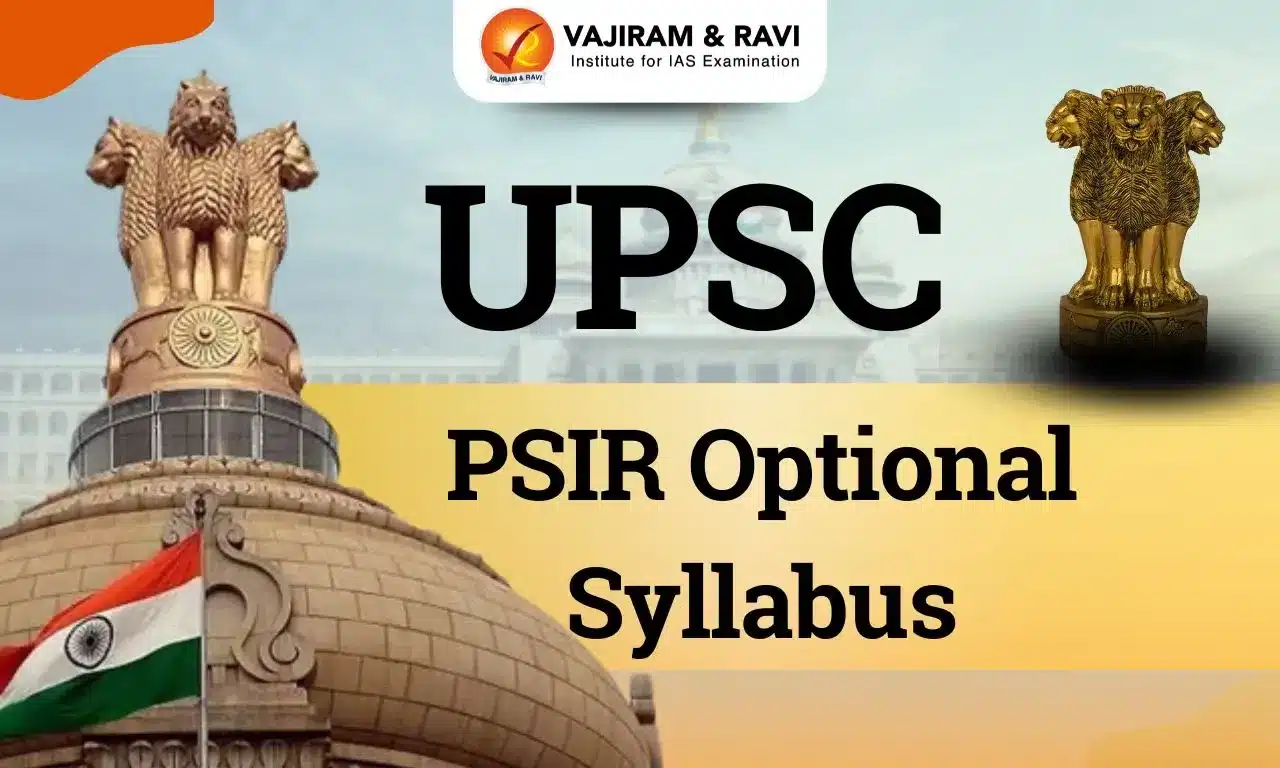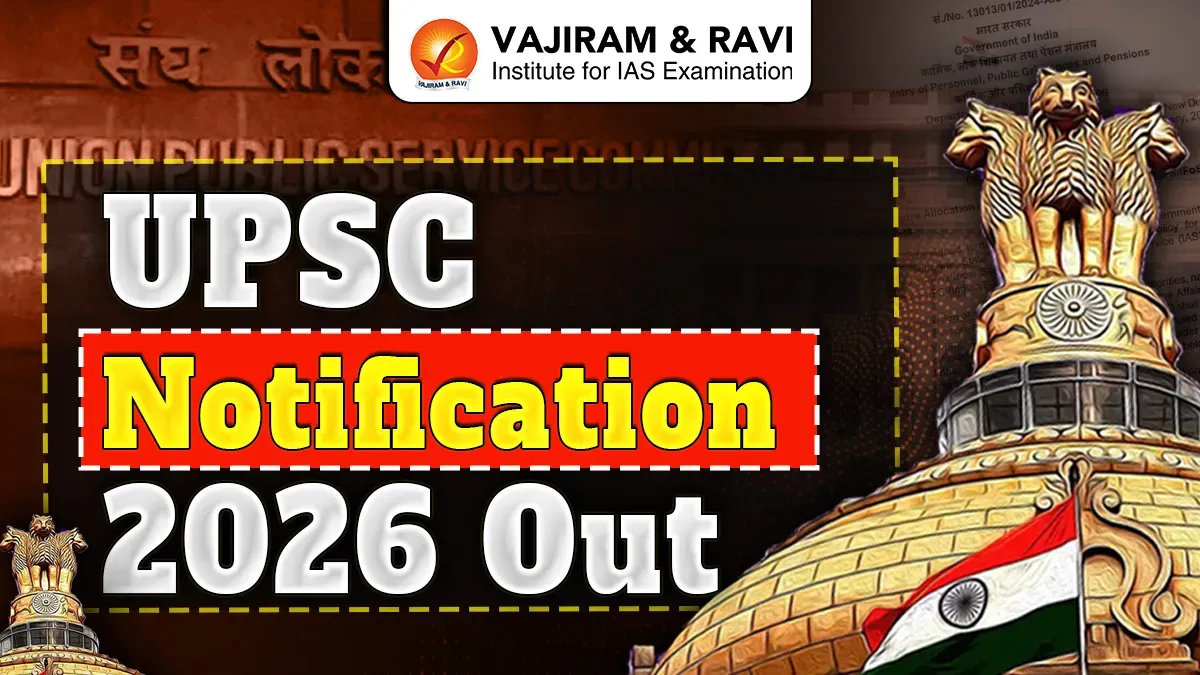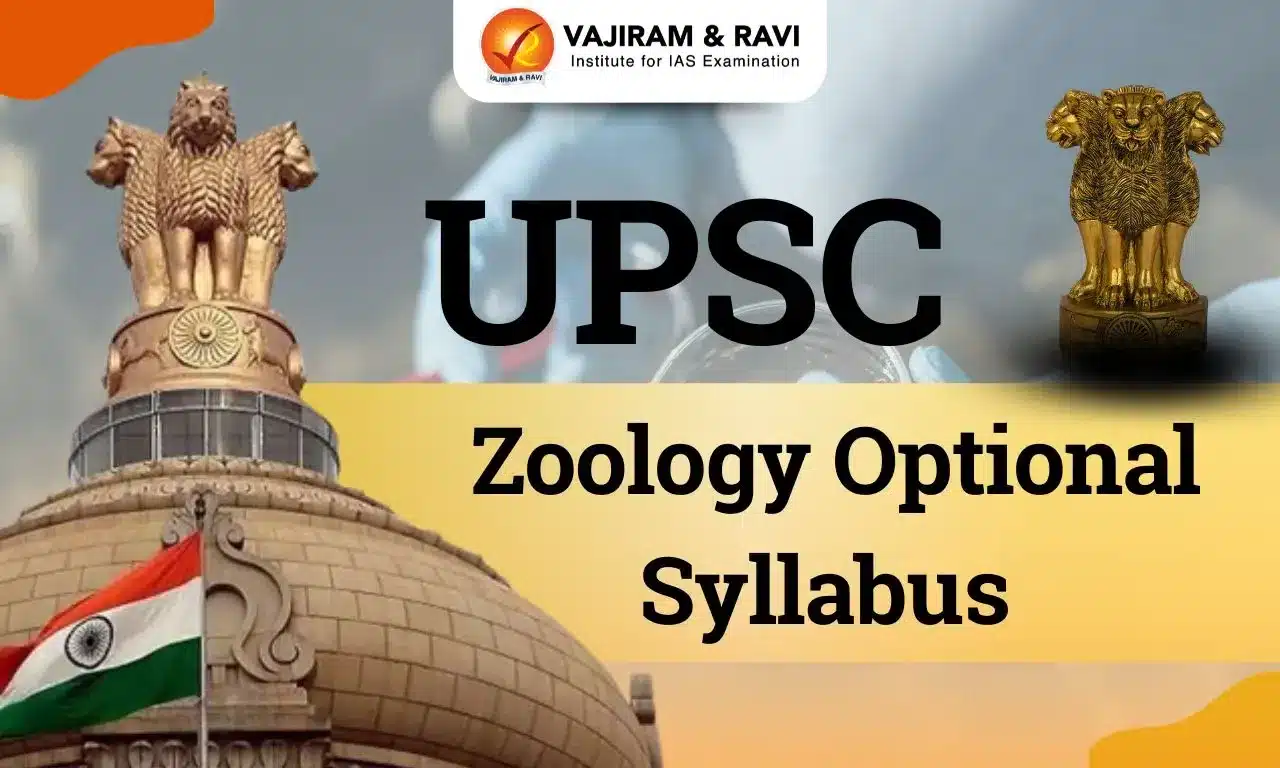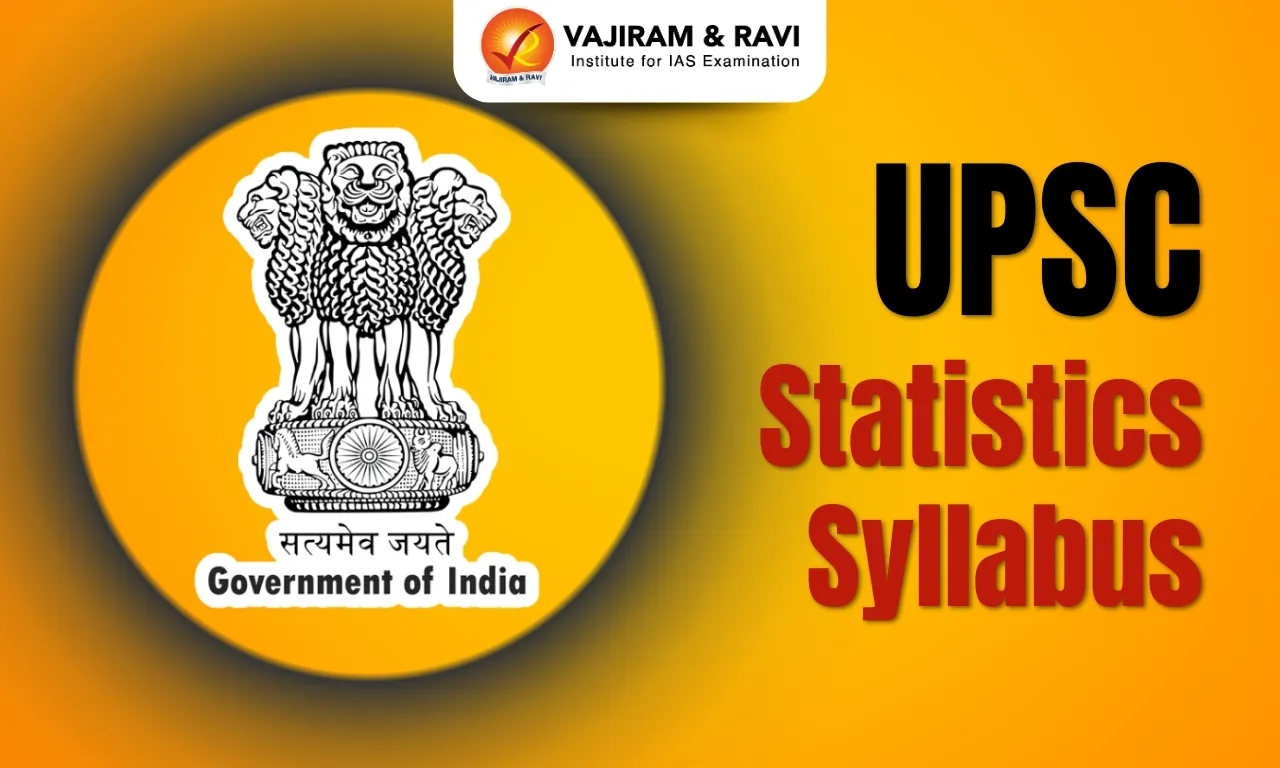The UPSC Political Science Syllabus for Paper 1 includes Political Theory, Indian Government and Politics, and the PSIR Optional syllabus for Paper 2- includes Comparative Political Analysis, International Politics, India and the World. Choosing the right optional subject is a crucial decision for aspirants preparing for the UPSC Civil Service Exam. Political Science and International Relations (PSIR) has been one of the most preferred optional subjects for the Civil services because of the consistency in scoring.
While Paper I is majorly conceptual and static, Paper 2 requires greater attention to contemporary events with greater emphasis on updated information along with conceptual clarity. With the changing trends of the optional paper, it is important that each section of the PSIR Optional Syllabus for paper 1 and paper 2 is covered comprehensively.
UPSC PSIR Optional Syllabus 2026
The PSIR optional syllabus seamlessly blends both static and dynamic elements in an easily comprehensible manner. Out of a total of 1750 marks for all Mains papers, the optional paper's weightage is 500 marks, that is, 250 marks for each paper.
Some advantages of choosing PSIR as your UPSC Optional Subject are as follows:
- Interest and Passion: Opting for PSIR allows you to study a subject you are genuinely interested in, making the learning process more engaging and productive.
- Scoring Potential: PSIR is known for its potential to yield high scores. Its well-structured syllabus allows for concise and analytical answers, which can enhance your exam performance. For example, In the UPSC CSE of 2022, a student of Vajiram & Ravi, Ms. Ishita Kishore, achieved AIR-1 with PSIR as her chosen optional subject.
- Overlapping with General Studies: There's a significant overlap between the PSIR syllabus and in areas like Indian Polity, International Relations, and Governance of GS Paper I for Prelims and GS II For Mains.
- Availability of Study Material: There is a wealth of study material available for Political Science, ranging from textbooks to coaching classes. This abundance of resources simplifies your preparation process.
- Relevant Current Affairs: PSIR is a dynamic subject closely tied to current political and international events. Studying it helps you stay updated with current affairs, a crucial aspect of the UPSC exam.
- Career Opportunities: A background in PSIR can open doors to various career opportunities beyond the UPSC exam. It can lead to roles in public administration, diplomacy, international organisations, and academia.
- Interdisciplinary Nature: PSIR is an interdisciplinary subject, drawing from fields like history, sociology, economics, and law. This interdisciplinary approach enriches your understanding of governance and politics, providing a broader perspective.
PSIR Optional Syllabus for Paper 1
The PSIR optional syllabus for Paper 1 is divided into several sections, covering various aspects of political theory, Indian political thought, Western political thought, and comparative politics. Candidates are expected to have a deep knowledge of these topics and the ability to critically analyze and apply various political theories and concepts.
Political Theory and Indian Politics
| Macro Topic | Micro Topics |
| Political Theory | Meaning and approaches. |
| Theories of state | Liberal, Neo-liberal, Marxist, Pluralist, post-colonial and Feminist. |
| Justice | Conceptions of justice with special reference to Rawl’s theory of justice and its communitarian critiques. |
| Equality | Social, political and economic; relationship between equality and freedom; Affirmative action. |
| Rights | Meaning and theories; different kinds of rights; Concept of Human Rights. |
| Democracy | Classical and contemporary theories; different models of democracy—representative, participatory and deliberative. |
| Concept of power | Hegemony, Ideology and Legitimacy. |
| Political Ideologies | Liberalism, Socialism, Marxism, Fascism, Gandhism and Feminism |
| Indian Political Thought | Dharamshastra, Arthashastra and Buddhist Traditions; Sir Syed Ahmed Khan, Sri Aurobindo, M. K. Gandhi, B. R. Ambedkar, M. N. Roy. |
| Western Political Thought | Plato, Aristotle, Machiavelli, Hobbes, Locke, John S. Mill, Marx, Gramsci, Hannah Arendt. |
Indian Government and Politics
| Macro Topic | Micro Topics |
| Indian Nationalism |
- Political Strategies of India’s Freedom Struggle:
- Perspectives on Indian National Movement; Liberal, Socialist and Marxist; Radical Humanist and Dalit. |
| Making of the Indian Constitution | Legacies of the British rule; different social and political perspectives. |
| Salient Features of the Indian Constitution | The Preamble, Fundamental Rights and Duties, Directive Principles; Parliamentary System and Amendment Procedures; Judicial Review and Basic Structure doctrine. |
| Principle organs of the government |
- Principal Organs of the Union Government: Envisaged role and actual working of the Executive, Legislature and Supreme Court. - Principal Organs of the State Government: Envisaged role and actual working of the Executive, Legislature and High Courts. |
| Grassroots Democracy | Panchayati Raj and Municipal Government; Significance of 73rd and 74th Amendments; Grassroots movements. |
| Statutory Institutions/Commissions | Election Commission, Comptroller and Auditor General, Finance Commission, Union Public Service Commission, National Commission for Scheduled Castes, National Commission for Scheduled Tribes, National Commission for Women; National Human Rights Commission, National Commission for Minorities, National Backward Classes Commission. |
| Federalism | Constitutional provisions; changing nature of centre-state relations; integrationist tendencies and regional aspirations; inter-state disputes. |
| Planning and Economic Development | Nehruvian and Gandhian perspectives; Role of planning and public sector; Green Revolution, land reforms and agrarian relations; liberalization and economic reforms. |
| Caste, Religion and Ethnicity in Indian Politics | N/A |
| Party System | - National and regional political parties, ideological and social bases of parties; Patterns of coalition politics; Pressure groups, trends in electoral behaviour; changing socio-economic profile of Legislators. |
| Social Movement | - Civil liberties and human rights movements; women’s movements; environmentalist movements. |
PSIR Optional Syllabus PDF
Here's the updated PSIR Optional Syllabus PDF for UPSC CSE 2026 Exam.
UPSC PSIR Optional Syllabus 2026 for Paper 2
The PSIR optional syllabus for Paper 2 is divided into several sections, covering various aspects of Indian government and politics, comparative politics, and international relations. Below is an outline of the PSIR Paper 2 syllabus:
Comparative Political Analysis and International Politics
| Macro Topic | Micro Topics |
| Comparative Politics |
- Nature and major approaches; - Political economy and political sociology perspectives; - Limitations of the comparative method. |
| State in Comparative Perspective | Characteristics and changing nature of the State in capitalist and socialist economies and advanced industrial and developing societies. |
| Politics of Representation and Participation | Political parties, pressure groups and social movements in advanced industrial and developing societies. |
| Globalisation | Responses from developed and developing societies. |
| Approaches to the Study of International Relations | Idealist, Realist, Marxist, Functionalist and Systems theory. |
| Key Concepts in International Relations |
- National interest, security and power; - Balance of power and deterrence; - Transnational actors and collective security; - World capitalist economy and globalisation. |
| Changing International Political Order |
- Rise of super powers; Strategic and ideological Bipolarity, arms race and cold war; Nuclear threat; - Non-aligned Movement: Aims and achievements. - Collapse of the Soviet Union; Unipolarity and American hegemony; Relevance of non-alignment in the contemporary world. |
| Evolution of the International Economic System |
- From Brettonwoods to WTO; - Socialist economies and the CMEA (Council for Mutual Economic Assistance); - Third World demand for new international economic order; - Globalisation of the world economy. |
| United Nations |
- Envisaged role and actual record; - Specialized UN agencies—aims and functioning; - need for UN reforms. |
| Regionalisation of World Politics | EU, ASEAN, APEC, AARC, NAFTA. |
| Contemporary Global Concerns | Democracy, human rights, environment, gender justice terrorism, nuclear proliferation. |
India and the World
| Macro Topic | Micro Topics |
| Indian Foreign Policy |
- Determinants of foreign policy; - The institutions of policy-making; - Continuity and change. |
| India’s Contribution | To the Non-Alignment Movement Different phases; Current role. |
| India and South Asia | - Regional Co-operation: SAARC-past performance and future prospects. - South Asia as a Free Trade Area. - India’s “Look East” policy. - Impediments to regional cooperation:
|
| India and the Global South |
- Relations with Africa and Latin America; - A leadership role in the demand for NIEO and WTO negotiations. |
| India and the Global Centres of Power | USA, EU, Japan, China and Russia. |
| India and the UN System |
- Role in UN Peace-keeping; - Demand for Permanent Seat in the Security Council. |
| India and the Nuclear Question | Changing perceptions and policy. |
| Recent developments in Indian Foreign Policy |
- India’s position on the recent crises in Afghanistan, Iraq and West Asia, growing relations with the US and Israel; - Vision of a new world order. |
UPSC PSIR Syllabus 2026 Preparation Strategy
Preparing for the PSIR optional syllabus requires a well-structured plan and a deep understanding of the syllabus. Here's a step-by-step guide on how to prepare for the UPSC PSIR optional:
Understand the Syllabus:
- Begin by thoroughly understanding the PSIR optional syllabus. Familiarize yourself with the topics and sub-topics mentioned in the UPSC syllabus to create a roadmap for your preparation.
Collect Study Materials:
- Gather the necessary study materials, including textbooks, and reference books.
Join a Coaching Institute:
- Enrolling in a coaching institute for PSIR is optional but can be beneficial if you require structured guidance. Vajiram and Ravi provide exam-oriented study materials, test series, and expert guidance.
Create a Study Plan:
- Develop a comprehensive UPSC study plan that covers the entire syllabus. Allocate sufficient time for each topic, giving priority to your strengths and areas that require more attention.
Study Plan:
- Start with political theories, as they form the foundation of the subject.
- Indian political system, constitution, comparative politics, and international relations for a comprehensive understanding of governance and global dynamics.
Current Affairs:
- Stay updated with current affairs, especially in the fields of politics, international relations, and governance. Read newspapers and magazines regularly.
Practice Answer Writing:
- Regularly practice answer writing to improve your ability to articulate your thoughts concisely and coherently. Use UPSC previous year question papers to practice.
Join a Test Series:
- Enroll in a PSIR Optional Test Series to assess your preparation and get feedback on your performance. Mock tests help you manage time effectively and refine your answering technique.
Revision:
- Regularly revise what you've learned to ensure retention. Create concise notes or mind maps for quick revision during the last few months before the exam.
Remember that UPSC PSIR optional is a vast subject, so it's crucial to manage your time wisely and focus on understanding concepts rather than rote learning.
Books to Prepare for PSIR Optional Syllabus
When it comes to choosing books for the Political Science and International Relations optional subject, it's essential to have a comprehensive and well-rounded list of books that cover the entire UPSC Political Science syllabus. Here's a recommended booklist for PSIR:
- A History of Political Thought: Plato to Marx- by Subrata Mukherjee & Sushila Ramaswamy (PHI)
- Western Political Thought- by OP Gauba (National Paperback)
- Political Ideologies- by Andrew Heywood (Red Globe Press)
- Political Theory – An Introduction to Political Science- by Rajeev Bhargav & Ashok Acharya (Pearson)
- Foundation of Indian Political Thought - by VR Mehta (Manohar)
- India’s Struggle for Independence- by Bipan Chandra (Penguin Random House)
- Indian Government and Politics- by BL Fadia (Sahitya Bhawan)
- The Oxford Companion to Politics in India- by Pratap Bhanu Mehta (Oxford)
- Comparative Politics- by J.C. Johari (Sterling Publisher PVT)
- Global Politics- by Andrew Heywood (Red Globe Press)
- Globalization of World Politics- by John Baylis, Steve Smith, Patricia Owens (Oxford University Press)
- The Oxford Handbook of Indian Foreign Policy- by David M. Malone, C. Raja Mohan, and Srinath Raghavan (Oxford Handbooks)
| Other Related UPSC Optional Syllabus | ||
|---|---|---|
|
UPSC Animal Husbandry & Veterinary Science Optional Syllabus |
|
|
Last updated on February, 2026
→ UPSC Notification 2026 is now out on the official website at upsconline.nic.in.
→ UPSC IFoS Notification 2026 is now out on the official website at upsconline.nic.in.
→ UPSC Calendar 2026 has been released.
→ Check out the latest UPSC Syllabus 2026 here.
→ Join Vajiram & Ravi’s Interview Guidance Programme for expert help to crack your final UPSC stage.
→ UPSC Mains Result 2025 is now out.
→ UPSC Prelims 2026 will be conducted on 24th May, 2026 & UPSC Mains 2026 will be conducted on 21st August 2026.
→ The UPSC Selection Process is of 3 stages-Prelims, Mains and Interview.
→ Prepare effectively with Vajiram & Ravi’s UPSC Prelims Test Series 2026 featuring full-length mock tests, detailed solutions, and performance analysis.
→ Enroll in Vajiram & Ravi’s UPSC Mains Test Series 2026 for structured answer writing practice, expert evaluation, and exam-oriented feedback.
→ Join Vajiram & Ravi’s Best UPSC Mentorship Program for personalized guidance, strategy planning, and one-to-one support from experienced mentors.
→ UPSC Result 2024 is released with latest UPSC Marksheet 2024. Check Now!
→ UPSC Toppers List 2024 is released now. Shakti Dubey is UPSC AIR 1 2024 Topper.
→ Also check Best UPSC Coaching in India
PSIR Optional Syllabus FAQs
Q1. Is PSIR Tough optional?+
Q2. Is PSIR high scoring?+
Q3. Can I complete PSIR optional in 3 months?+
Q4. What is the syllabus of PSIR optional?+
Q5. Which is better, sociology or PSIR?+
















